新概念英语第二册 第二课
新概念英语第二册笔记(精美打印版)
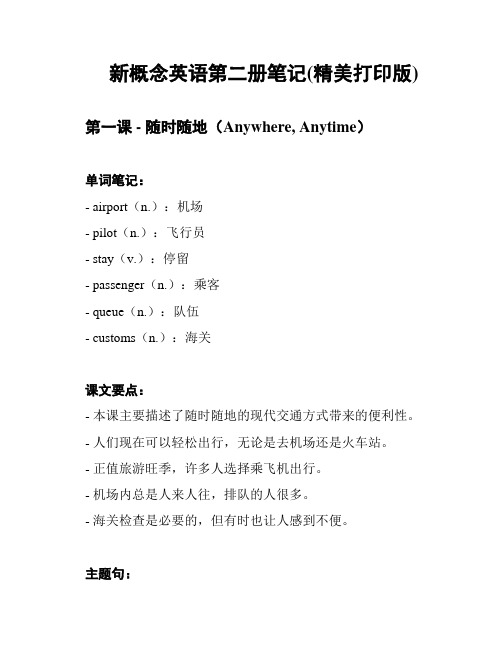
新概念英语第二册笔记(精美打印版)第一课 - 随时随地(Anywhere, Anytime)单词笔记:- airport(n.):机场- pilot(n.):飞行员- stay(v.):停留- passenger(n.):乘客- queue(n.):队伍- customs(n.):海关课文要点:- 本课主要描述了随时随地的现代交通方式带来的便利性。
- 人们现在可以轻松出行,无论是去机场还是火车站。
- 正值旅游旺季,许多人选择乘飞机出行。
- 机场内总是人来人往,排队的人很多。
- 海关检查是必要的,但有时也让人感到不便。
主题句:现代交通方式的进步使我们能够随时随地旅行。
语法重点:- 本课中出现了一些现在进行时的句子,如:People are going to airports and railway stations.(人们正前往机场和火车站。
)- 该课还涉及到一些定冠词的用法,如:I like the customs officer.(我喜欢海关工作人员。
)- 其他值得注意的语法点包括人称代词的宾格形式、形容词比较级等。
第二课 - 奇怪的事(Something Strange)单词笔记:- strange(adj.):奇怪的- fly(v.):飞- cloud(n.):云- monster(n.):怪物- little(adj.):小的- eat(v.):吃- bird(n.):鸟课文要点:- 本课主要讲述了一个小男孩和他的奇怪经历。
- 有一天,男孩看到了一只怪物,它是一个身穿红色衣服、长着绿色头发和眼睛的生物。
- 怪物告诉男孩,他不会飞,但是他能飞到云中间。
- 然后,怪物吃了一些小鸟。
- 最后,怪物告诉男孩他会在树上等待,然后就飞走了。
主题句:男孩看到了一个奇怪的怪物,并与它进行了交谈。
语法重点:- 这篇课文中包含了一些过去式的动词,如:He ate five small birds.(他吃了五只小鸟。
(完整版)新概念英语第二册课文原文 (2)
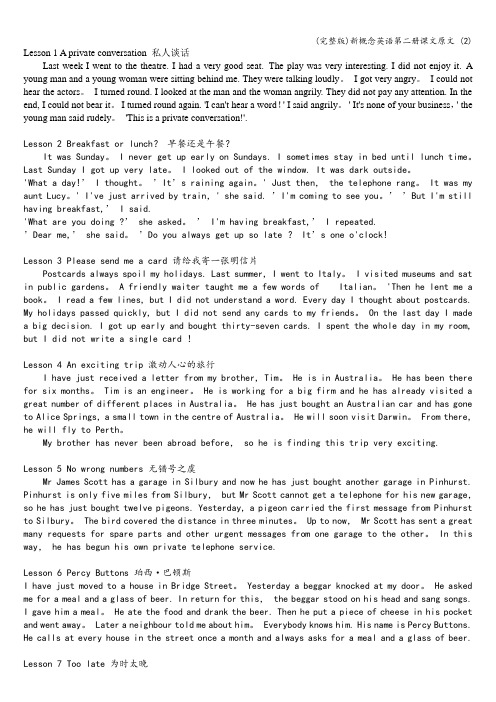
Lesson 1 A private conversation 私人谈话Last week I went to the theatre. I had a very good seat. The play was very interesting. I did not enjoy it. A young man and a young woman were sitting behind me. They were talking loudly。
I got very angry。
I could not hear the actors。
I turned round. I looked at the man and the woman angrily. They did not pay any attention. In the end, I could not bear it。
I turned round again. 'I can't hear a word!' I said angrily。
' It's none of your business,' the young man said rudely。
'This is a private conversation!'.Lesson 2 Breakfast or lunch?早餐还是午餐?It was Sunday。
I never get up early on Sundays. I sometimes stay in bed until lunch time。
Last Sunday I got up very late。
I looked out of the window. It was dark outside。
'What a day!’ I thought。
’It’s raining again。
(完整)新概念英语第二册第二课(包含课文、练习及答案)

新概念英语二 Lesson 2Lesson 2 Breakfast or lunch?First listen and then answer the question。
听录音,然后回答以下问题.Why was the writer’s aunt surprised?It was Sunday. I never get up early on Sundays。
I sometimes stay in bed until lunch time. Last Sunday I got up very late. I looked out of the window。
It was dark outside. ‘What a day!' I thought。
‘It’s raining again。
’ Just then, the telephone rang。
It was my aunt Lucy。
‘I've just arrived by train,' she said。
‘I’m coming to see you.'‘But I'm still havi ng breakfast,’ I said。
‘What are you doing?’ she asked。
‘I'm having breakfast,' I repeated。
‘Dear me,' she said. ‘Do you always get up so late?It's one o’clock!'New words and expressions 生词和短语until prep. 直到 outside adv. 外面ring v. (铃、电话等)响 aunt n。
姑,姨,婶,舅母repeat v。
重复Note on the text 课文注释1 on Sundays,指每个星期日。
新概念英语第二册第二课课文及课后练习题

Lesson 2 Breakfast or lunch?It was Sunday. I never get up early on Sundays. I sometimes stay in bed until lunch time. Last Sunday I got up very late. I looked out of the window. It was dark outside. 'What a day!' I thought. 'It's raining again.' Just then, the telephone rang. It was my aunt Lucy. 'I've just arrived by train,' she said. 'I'm coming to see you.''But I'm still having breakfast,' I said.'What are you doing?' she asked.'I'm having breakfast,' I repeated.'Dear me,' she said. 'Do you always get up so late? It's one o'clock!'New words and expressions 生词和短语until prep. 直到outside adv. 外面ring v. (铃、电话等)响aunt n. 姑,姨,婶,舅母repeat v. 重复参考译文第二课早餐还是午餐?那是个星期天,而在星期天我是从来不早起的,有时我要一直躺到吃午饭的时候。
上个星期天,我起得很晚。
我望望窗外,外面一片昏暗。
新概念英语第二册第二课教案
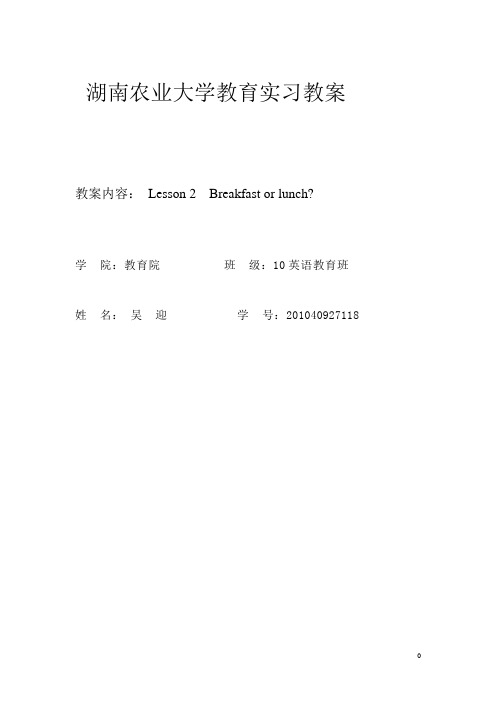
湖南农业大学教育实习教案教案内容:Lesson 2 Breakfast or lunch?学院:教育院班级:10英语教育班姓名:吴迎学号:201040927118Lesson 2 Breakfast or lunch?Teaching Aims and demands:1.Review the usage of Special Question.2.Master the usage of present continuous , and the word ―what‖.3.Grasp the following words and phrases:until, outside, ring, aunt, repeat, get up , stay, look out of, what a day, just then, by train, have breakfast,dear me.4.Learn a kind of word formation by adding affix —affixation5. Practice oral English with the topic ―A great breakfast I have at primary school/university‖.Teaching Content: Text ; Exercises (from Vocabulary to Writing)Teaching Key points and difficult points:1.the usage of present continuous.2.until, ring, repeat, get up, stay, look out of, just then, dear me.Teaching Periods: 6 periodsTeaching Procedures:Period 1-2:Ⅰ. Introduction to the text by asking some questions.Questions:1.Is it hard for you to get up early?2.Do you usually stay in bed very late?3.What time do you get up everyday?4.Do you usually have breakfast in lunchtime? Why?5.Do you remember your last brunch in school?6.Do you think it’s good for your health to have breakfast in lunchtime? Why?7.How do you usually make yourself have breakfast at the right time?8.Can you be an early bird for a month? ―Yes‖ or ― No‖?Ⅱ.Ask students to go through the text and finish the pre-class work to get the main idea of the text. Then analyze the text the general idea .Ⅲ. Explain the text in details.1. until prep. : up to the point in time or the event mentioned.e.g: Until she spoke I hadn’t realized she wasn’t English.You can stay on the bus until London (=until you reach London.)*from morning ~night.※ till (informal)1) conj./prep =untile.g. :Can’t you wait till we get home?2) n. the place were you pay for goods in a large shop/store.*a long queue at the tille.g. :Please pay at the till.3) v. (old use) to prepare and use land for growing crops.Usage Note:Till is generally felt to be more informal than until and is used much less often in writing. At the beginning of a sentence, until is usually used.2.outside1). adv. not in a room,building or container but on or to the outside of it. 在外面,向外面e.g. I’m seeing a patient ---please wait outside.It’s warm enough to eat outside.2) n. The outer side or surface of sth 外部e.g. I didn’t go into the temple---I only saw it from the outside.* At the ~ = at the moment = as a maximum* on the ~ :①Used to describe how sb appears or seemsOn the outside she seems calm, but I know she’s worried.②Not in prionLife on the outside took some getting used to again.3) adj./prep.She has a lot of outside interests (= not connected with her work)They fell cut off from the outside world.(=from other people and from other things that were happening) ~ chance of winning 胜算极小~of = apart frome.g. There was nothing they could do, outside of hoping things would get better.3.ring1) v. (rang, rung)~ sb. upI’ll ring you up later.~ sth. upShe rang up all the items on the till.~ for sth.Could you ring for a cab.~ (with sth.): to be full of a sound. 回想Applause rang through the hall.~ offHe rang off before I could explain.2) n.①give sb a ~: to make a telephone call to sb.E.g. I’ll give you a ring tomorrow.have a ~ of truth 真实可信E.g. His explanation has a ring of truth about it.②circleA key ~E.g. The children sat on the floor in a ring.③JewelleryE.g. A diamond glittered on her ring finger.4 .aunt : the sister of your father or mother; the wife of your uncle.E.g. My aunt lives in Canada.Auntie (= aunty ):Auntie Mary.5.repeat v.1) say/write again.To ~ a question.Do say if I’m repeating myself (=if I have already said this).He’s fond of repeating that the company’s success is all down to him.2) do againThey are hoping to repeat last year’s victory.To ~the class /year/grade(=in a school, to take the class/ year /grade again)重修这门课;重读一年;留级3)happen againHistory has a strange way of repeating itself.Repeatable adj. (usually in negative sentences)Repeated adj. (happening, said or done many times)~ absences from work.Repeatedly adv.E.g. The victim had been stabbed repeatedly in the chest.6 . get up: to stand up after sitting, lying, ect. ; to get out of bed.E.g. The class got up when the teacher came in.Could you get me up at 6:30 tomorrow.7.Stay1) stay in : to not go out or to remain indoorsE.g. I feel like staying in tonight.2)stay up : to go to bed later than usual.E.g. You’ve got school tomorrow. I don’t want you staying up late.3) stay away (from sb /sth): to not go near a particular person or place.E.g. I want you to stay away from my daughter.8.lookE.g. The teacher told us to look at the blackboard.That looks like an interesting film.Glance: take a quick look.E.g. She glanced at her watch during the talk.Gaze :a long steady look at sb/sth.E.g. She felt embarrassed under his steady gaze.Glare : a long angry look at sb/sth.E.g. The old woman glared at him9.Just then: at the momentE.g. Just then, someone knocked at the front door.Just then, my girlfriend drove up and gave me a ride.10.Dear me: used in expression that show that you are surprised, upset, annoyed or worried.E.g. Dear me! What a mess!Dear oh dear! What are you going to do now?11.What a day! =what a day it is ! =>elliptical sentenceE.g. This is a beautiful picture.= What a beautiful picture.She is careless. = How careless she is.12.I’m comeing to see you.Be +Ving +to : used to show that sth is likely to happen very soon or in the future.E.g. I think I’m going to faint.Look at these black clouds--- it is going to rain.15. Word formation-----affixationAdv. –ly(the suffix –ly ,from Middle English, is added to adjectives to form adverbs.)adj. Adv.repeated repeatedlylate latelyPeriod 3-4Ⅳ. Do some oral practice.1.Ask students to retell the story based on the following questions by using theexpressions in the text.Questions concerned:a. Does the writer always get up early on Sunday, or does he always get up late?b.Did he get up early last Sunday, or did he get up late?c.Who telephoned then?d. Had she just arrived by train, or had she come on foot?e.Did he say,’ I’m still having breakfast’, or did he say ,’ I am still in bed’?f.Was his aunt very surprised or not?g.What was the time?2.Topic: A great breakfast I have at primary school/universityExpressions for reference:(great,campus, delicious, roommates, cheap, etc.)(unforgettable, amusing, surprised, various, etc.)Ⅴ. WritingAsk students to write a summary about this text in not more than 55 words.Ⅵ. ConclusionAsk some students to read their summaries and evaluate the best one. Analyze the reasons why his/hers is the excellent.(talk about the skills)Period 5-6Ⅶ. Do some exercises in class and check the answers.1. When Aunt Lucy telephoned _____.A.the writer was asleep.B. the writer was still in bed.C. the writer had already got up.D. the writer was having lunch.2. Aunt Lucy was surprised because_____.A. the writer was having lunch.B. it was one o’clock.C. it was late.D.the writer was having breakfast at lunchtime.3. Write these sentences again. Each sentences must begin with what.a. This is a wonderful garden!b. This is a surprise!c. He is causing a lot of trouble.d. They are wonderful actors!e. She is a hare-working woman.f. You are a clever boy.4. Give the correct form of the words in parentheses.a. he is still _______(sleep).b. It (begin) to rain before she took a taxi.c. When all the guests had left, Derek (arrive).Ⅷ.Assignments :1. Structure& V ocabulary : P192. Writing: An unforgotten day in school.。
(完整版)新概念英语第二册第二课(包含课文、练习和答案)
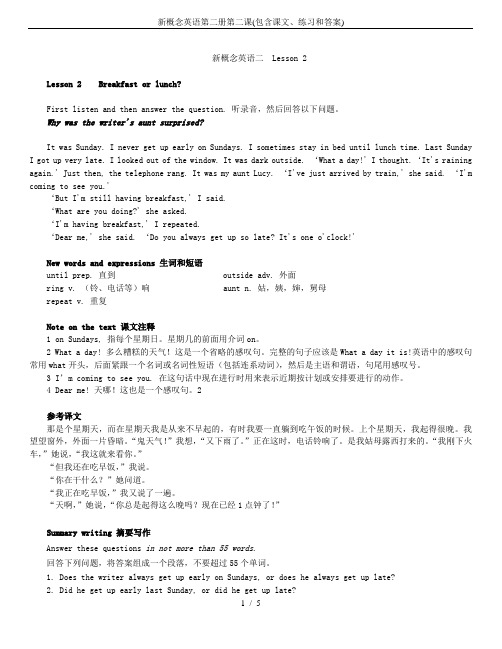
新概念英语二 Lesson 2Lesson 2 Breakfast or lunch?First listen and then answer the question. 听录音,然后回答以下问题。
Why was the writer's aunt surprised?It was Sunday. I never get up early on Sundays. I sometimes stay in bed until lunch time. Last Sunday I got up very late. I looked out of the window. It was dark outside. ‘What a day!' I thought.‘It's raining again.' Just then, the telephone rang. It was my aunt Lucy. ‘I've just arrived by train,' she said. ‘I'm coming to see you.'‘But I'm still having breakfast,' I said.‘What are you doing?' she asked.‘I'm having breakfast,' I repeated.‘Dear me,' she said. ‘Do you always get up so late? It's one o'clock!'New words and expressions 生词和短语until prep. 直到 outside adv. 外面ring v. (铃、电话等)响 aunt n. 姑,姨,婶,舅母repeat v. 重复Note on the text 课文注释1 on Sundays, 指每个星期日。
新概念英语第二册第02课
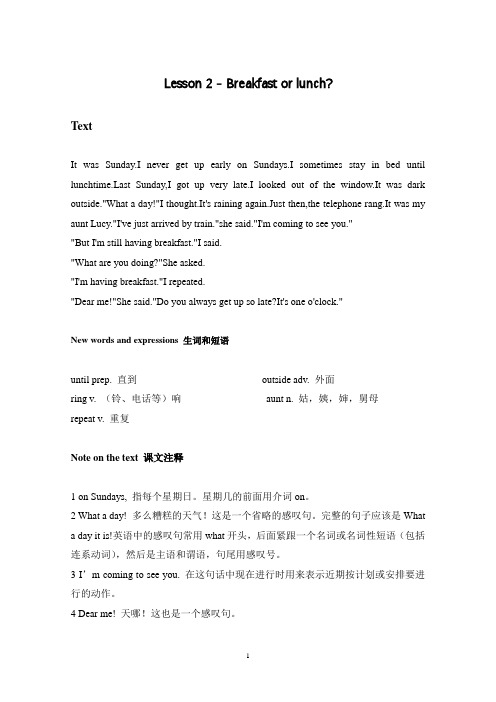
Lesson 2 - Breakfast or lunch?TextIt was Sunday.I never get up early on Sundays.I sometimes stay in bed until st Sunday,I got up very late.I looked out of the window.It was dark outside."What a day!"I thought.It's raining again.Just then,the telephone rang.It was my aunt Lucy."I've just arrived by train."she said."I'm coming to see you.""But I'm still having breakfast."I said."What are you doing?"She asked."I'm having breakfast."I repeated."Dear me!"She said."Do you always get up so late?It's one o'clock."New words and expressions 生词和短语until prep. 直到outside adv. 外面ring v. (铃、电话等)响aunt n. 姑,姨,婶,舅母repeat v. 重复Note on the text 课文注释1 on Sundays, 指每个星期日。
星期几的前面用介词on。
2 What a day! 多么糟糕的天气!这是一个省略的感叹句。
完整的句子应该是Whata day it is!英语中的感叹句常用what开头,后面紧跟一个名词或名词性短语(包括连系动词),然后是主语和谓语,句尾用感叹号。
新概念英语第二册第2课笔记

新概念英语第二册第2课笔记【原创版】目录一、新概念英语第二册第 2 课的内容概述二、如何有效地学习新概念英语第二册三、新概念英语第二册课文翻译及学习笔记正文一、新概念英语第二册第 2 课的内容概述新概念英语第二册第 2 课是一篇关于早餐和午餐的短文。
文章通过描述作者在不同的星期天早上和午餐时间的生活,表达了作者对周末懒散生活的享受。
文章中涉及了早餐和午餐的食物选择,以及作者在周日的作息规律。
二、如何有效地学习新概念英语第二册1.充分利用教材优势:新概念英语教材具有易入门、课文经典、习题典型等特点,适合自学。
在学习过程中,要重视课文的阅读和理解,以及课后习题的练习。
2.制定合理的学习计划:根据自己的英语基础和时间安排,制定适合的学习计划。
合理分配学习时间,确保每个阶段的学习效果。
3.掌握英语音标:英语音标是英语学习入门的关键内容。
掌握了英语音标的具体读法,可以帮助大家更快速地掌握英语发音,提高英语听力和口语能力。
4.坚持练习:学习新概念英语需要长时间的坚持。
只有通过不断地练习,才能提高英语能力。
在练习过程中,要注重听力、口语、阅读和写作等方面的综合提高。
三、新概念英语第二册课文翻译及学习笔记新概念英语第二册第 2 课的课文翻译如下:早餐还是午餐?这是一个问题。
周日,我通常不会早起。
有时候,我会在床上直到午饭时间。
上个周日,我起得很晚。
我望向窗外,天色很暗。
真是个特别的一天!在学习这篇课文时,可以注意以下几点:1.理解课文内容,熟读课文,掌握关键词和句子。
2.学习课文中的语法结构,如条件句、时态等。
3.积累课文中的实用短语和表达,如“早餐还是午餐?”、“天色很暗”等。
- 1、下载文档前请自行甄别文档内容的完整性,平台不提供额外的编辑、内容补充、找答案等附加服务。
- 2、"仅部分预览"的文档,不可在线预览部分如存在完整性等问题,可反馈申请退款(可完整预览的文档不适用该条件!)。
- 3、如文档侵犯您的权益,请联系客服反馈,我们会尽快为您处理(人工客服工作时间:9:00-18:30)。
6. ☆I'm coming to see you.我将要来看你。用come的 现在进行时态be coming表示一般将来
同样的用法还有:go, come, leave, arrive, land, meet,
die, start, return, join...这些词可用现在进行时态表示将 要进行的动作)
private conversation theatre seat
私人的
谈话
剧场,戏院 座位
play
loudly
戏
大声地
angry angrily attention bear
生气的 生气地 注意 容忍
business
rudely
事
无礼地,粗鲁地
A. New words (in Lesson Two)
我每天步行去上学。
_________________________________ I go to school on foot every day.
我每天乘这辆公交车去上班。
_____________________________ I go to school on this bus.
5. ☆It was my aunt Lucy. 打电话的是我姨妈Lucy. 如果 不知道对方性别时,可以用it取代。
如有人敲门,可以问: ☆1)aunt n.姑,姨,婶,舅母
2)n. 叔叔;伯父;舅父;姑父,姨父是_______ uncle
翻译:谁呀?是我,约翰。____________________ Who is it? It’s me, John. (宾格)
堂兄妹(不分男女):_______ 外甥:___________; cousin nephew
until [ʌnˈt l] ɪ outside [aʊtˈsa ɪd,
prep. 直到
adv. 外面 v. (铃、电话等)响起
ˈ aʊtˈsa ɪd]
ring [rɪŋ] (rang, rung) v. aunt [ɑ:nt] n. repeat [riˈpi:t v. ]
n. 姑,姨,婶,舅母
He died ______ a rainy day. 他是在一个雨天死去的。 on
2. I sometimes stay in bed until lunchtime. ☆ until prep. 直到……时间; 在否定句中,until 表示 在……之前, 直到……才…… ♥ 区分“直到……才”(not until) 和“直到……为止 ”(until) 的方法: 把until作为时间终止线。从句的时间终点之前,这个
8. ☆ring (rang,rung) v.(铃、电话等)响 [注] 这种响是刺 耳的,往往是提醒人做某事 如:The telephone/door bell is ringing. ♥而风铃等响要用jingle ; jingle (bell):(铃儿)响叮当 v. 给某人打电话:ring sb n. 打电话:give sb a ring n. 戒指 翻译:记着给我打电话。
New Concept English 2
ቤተ መጻሕፍቲ ባይዱ
Lesson Two
Breakfast or Lunch
一、教学目标:
★帮助学生增强语言的运用能力和培养良好的语感
二、教学重点:
★课文的听、读、以及改写 ★关键句的讲解; ★句子结构的分析; ★短语和习惯用法;
A. New words (in Lesson One)
How+ adj./adv. +主语+谓语
2.) 省略:
(1) 主、谓随时可省 eg: What a good girl (she is)!
(2) 省形容词
[注]有上下文和一定的语境,才能省略形容词。 如本文的What a day! 根据上下文的It was dark outside.和
It's raining again .可以推断出省略的是terrible.
随堂练习:翻译下列句子: •真精彩呀!_______________________________ How wonderful! (it is) How fast he ran! •他跑得多快呀!__________________________ What a beautiful flower! •多么漂亮的花呀!________________________
•
•
__________________________ How beautiful the flower is!
•What beautiful flowers they are! __________________________
• 多么美好的天气 •What fine weather it is! __________________________
翻译下列句子:
你很快就要离开吗?________________________ Are you leaving soon?
他今晚要去剧院看戏。 He’s going to the theatre this evening. ______________________________________ 将要在5分钟后到达。
Remember to ring me. = Remember to ________________________________ give me a ring.
9. ☆look out of向……外面看;out of是固定搭配, 如:
从水里跳出来 _________of jump out ____ the water.
out of 的反义词为:______ , into
如:向箱子里面看 look into the box. __________________
10. Dear me! ☆天哪!表惊讶。 还可以说:___________; My goodness! __________________; Good Heavens!
★翻译下列生词和短语( read and finish the following exercise) 呆在床上不起来_____________ stay in bed 直到_____________ until 起床早_____________ get up early get up late 起床晚_____________ 向窗外看_____________ look out of the window
My dear! _____________;
_________________ My god! 注:My goodness! Good Heavens! 天哪,表惊讶! 英国人说Dear me!或My dear! 美国人说:o发啊的音 )
1)英语中早起的人用an early bird 表示;英语中的谚
C. Language points; sentence patterns;
and grammar
单词拓展与巩固练习 (key
words and expressions)
1.) I never get up early on Sundays. (每个星期天,星期
天通常这样)
on Monday afternoons I go to the library_____________________. 我每个星期 一下午都要去图书馆。
语有:The early bird catches the worm. 译成:______ 捷足先登
2) Breakfast or lunch: 表示在该吃午饭的时候吃早饭 早午餐 ;试猜测:brunch的含义:________
v. 重复
B.The text: Breakfast or Lunch
1. Questions on the text (listen and answer) : 1) Who was coming to see the writer? It was aunt Lucy.
2) What was the weather like last Sunday? The weather was very bad. It was lunch time,
动作做了还是没做?
做了——肯定;没做——否定。
eg: He___until it stopped raining. A. waited B. didn't wait A C
A. leave. B. left C. didn't leave
♥后面加(时间状语)从句,前面就是主句
翻译: • 博物馆到晚上6点才关门(open)。 The museum is open until 6 ________________________ pm. 2. 我直到午饭时间才起床(get up)。 I didn’t get up until lunchtime. __________________________________
repeat 重复_____________
外面_____________ outside ring (铃、电话等)响_____________
3. Listen again and complete the following text.
It was ________. I _______ get up early _____ Sundays. I Sunday never on sometimes stay in bed ______ lunchtime. Last Sunday I got until up very_____. I looked out of the window. It was dark late ______. 'What a day!' I thought. 'It's raining again.' Just then, outside the telephone ______ . It was my aunt Lucy. 'I've just arrived rang _____ train,' she said. 'I'm coming see you.' ______to by 'But I'm _____having breakfast,' I said. still 'What are you doing?' she asked. 'I'm having breakfast,' I repeated. ‘_____________,' she said. 'Do you always get up ____late? Dear me so It's one o'clock!'
